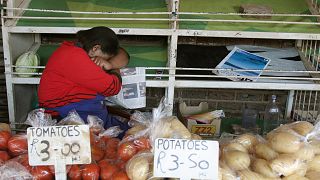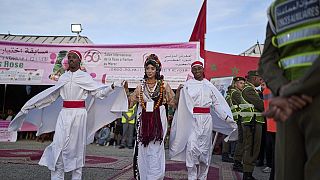Morocco
As most business owners world wide grapple with the economic effect of the coronavirus, Moroccan casual workers say the virus is threatening workers in the country’s , without contracts and without social protection.
The situation is particularly critical in the North African country marked by great inequalities and where the rate of informal employment reaches 79.9% compared to 63.3% in Algeria and 58.8% in Tunisia, according to figures from the International Labour Organization (ILO).
Ahmed a 48 year-old street vendor in Rabat said he used to sell clothes but says nowadays, nobody wants to buy clothes anymore, he adds everybody is looking for medicine. “The product I sell is out of stock in pharmacies, that’s why I sell it cheap: five to seven dirhams for the (facial) mask, two dirhams for the gloves.”
“I used to be a hawker on the same street that is empty today. The state has tightened the reins a bit, we can’t sell freely and then go home. And if I go home, what will I eat? I have no insurance, no monthly salary, nothing. Our daily routine is to bring back at least 60 dirhams, 50 or even 40 dirhams to feed the children.“Ahmed said.
Ahmed reiterated that they do not have an alternative, and does not have a monthly salary like others, civil servants, employees or those who work in departments. He says a street vendor has nothing at all.”
“We’re hiding here and that’s it. We can’t save or put money aside. We just live to pay the rent, to eat and that’s it, we can’t do anything else besides that,” said Chrif Haytoti, fruit merchant in the medina of Rabat.
No! I’m in lockdown in Morocco and it’s snowing but still feeling good. pic.twitter.com/yvFv2P4g1K
— alice morrison (@aliceoutthere1) March 23, 2020
Morocco’s Ministry of Interior and Ministry of Industry this week issued a list of the professional activities authorized to continue operating despite the national state of emergency.
Commercial activities authorized to continue their operations include stores of all sizes for groceries, vegetables, fruits, meats, pastries, olives, spices, dried fruits, cleaning products, drugs, medical equipment, spare parts, and agricultural products and equipment.














01:54
"Great economic potential in Africa": five African leaders have lunch with Trump
11:19
Cyber Africa Forum highlights Benin's bold digital resilience [Business Africa]
Go to video
World Bank grants South Africa $1.5B for infrastructure, green energy
11:16
Angola hosts U.S.-Africa summit amid calls to revive trade ties {Business Africa}
01:30
Abu Dhabi hosts first Global South Economic Forum
01:23
Fourth edition of China-Africa Economic and Trade Expo opens in Changsha